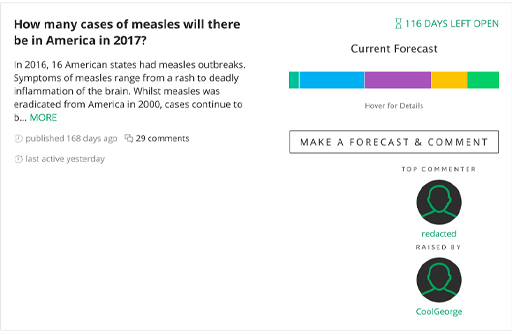4 The wisdom of crowds
You have probably heard of the ‘wisdom of crowds’. This is the observation that if you get a large number of people to estimate something, and then take the average of their estimates, the result is often close to the true value.
In his book The Wisdom of Crowds, James Surowiecki (2004) suggested that a variant of this idea could be applied to decision making. If a large number of people give independent answers, their individual differences may balance out, leading to the group as a whole reaching a good decision.
A similar idea lies behind the crowd-forecasting website Almanis (Figure 4). People can join for free and become forecasters, providing answers to a wide range of questions. Members can also raise their own questions. They can earn rewards, including cash, by contributing to accurate forecasts.
Almanis says, ‘Combining many individuals’ forecasts dramatically increases accuracy.’ But do crowd-sourcing forecasts or estimates really result in improved accuracy?
You can now take part in a simple experiment created for this course. It won’t provide conclusive evidence either way about the wisdom of crowds, but it is an interesting example to try.
Activity 7 Join the crowd
Figure 5 is a computer-generated graphic of random circles. Have a go at estimating how many there are. Your estimate should not be a simple wild guess but an estimate. You aren’t going to count all of the circles because it would take too long. Instead, you could count the number in a small area and then mentally scale up, for example.
Visit this poll [Tip: hold Ctrl and click a link to open it in a new tab. (Hide tip)] and place your guess in the field provided. You will then see a running average of all the estimates entered to date.
Discussion
The wisdom of crowds predicts that the more people who submit their estimates to the running poll, the closer the running average will be to the actual number.
The exact number of circles is: 3307.
The next section explores how accurate you can be when making estimates about the society you live in.



